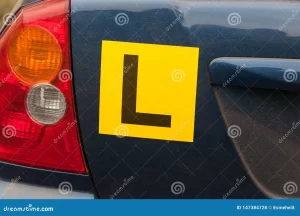Waiting to cross an intersection, I noticed the loud blaring of a car horn, from the third car back from the lights. I realised that the front car had not progressed and then I noticed that the driver was a learner.
Many drivers are impatient in the traffic, but when we see someone sporting the L-plates we remember that once we were that person, and generally we are more tolerant. In this situation I imagine the horn-blasting driver could not see the L plates …
 Actually, we are all on our L plates, in this life. It seems to me that it really changes how we live if we can simply acknowledge that to ourselves.
Actually, we are all on our L plates, in this life. It seems to me that it really changes how we live if we can simply acknowledge that to ourselves.
One incident in my life has indelibly imprinted this upon my own perspective. In 2009 there were horrific bush fires in Victoria. Hundreds of homes were destroyed and many people lost their lives. Immediately there were outcries and media accusations about who should have done what, to prevent the fires or to manage the situation better. In reality, no one could have prevented those fires and the fire crews can only be applauded for their amazing efforts. They were doing the best they could—and some of them lost their homes, some their lives, and many will never be the same again after such trauma.
Which brings me to my own experience. Lying in a hospital bed in Samoa, later that same year, and as yet now knowing what my injuries were from the tsunami that had overcome me, my wife and daughter that morning, I became immediately aware of the limited resources of this place, and the incredible kindness and devotion of the people working there, some of whom had actually lost their homes, some did not know whether their own families were among the dead—and still they did their jobs and cared for us.
All of these were doing the best they could. Absolutely. That expression had stayed with me since I first saw the movie On Golden Pond, way back in the early 1980s. The movie stars Henry Fonda and Katherine Hepburn, an elderly couple who are somewhat estranged from their daughter and her teenage son. In the story, the daughter asks her parents if they could take Billy with them to their lakeside cabin for the summer. It is a fairly tense time for them all, as Billy makes it clear he doesn’t want to be there, with these old fogies and ‘nothing to do’. At a crucial moment, Katherine Hepburn’s character Ethel tries to help the boy understand what is happening, and on her husband’s behalf she pleads with Billy, ‘What you need to see is, he’s doing the best he can’.
Gradually and beautifully a relationship blossoms. But what it needed was that little bit of open-heartedness to see that the old man was indeed trying, making an effort to care, to be there for him, ‘doing the best he can’.
Again and again I have found myself, often with tears in my eyes, seeing people doing the best they can—sometimes not how I would do it, sometimes struggling with the fundamentals of life, hoping to make ends meet, trying to help their children, or aged parents, or simply going for a walk to keep their old bones moving—everywhere there are people doing the best they can.
But we have built a hyper-critical culture, demanding inhuman efforts from everyone from our government members to those who teach our children, or serve in shops, or every other place and situation, right down to the car in front at the lights.
We need to stop and think: first of all to make sure that everyone is safe, and not in difficulty. Then, to consider that they might need a split second longer than we do, to get the car moving, actually or figuratively.
And we need to remember that we too had to learn to drive, and in reality we are all the time learning to live—in our daily lives, relationships, and all the transitions and development we have to deal with.
We can learn to do better. I found this quotation from the poet Maya Angelou:
“Do the best you can until you know better.
Then when you know better, do better.”
We can do better at understanding one another and ourselves. ‘They are doing the best they can’—and paradoxically the more we allow them this simple dignity, the more likely they will actually do better. So will we.

Thanks again for your reflection Frank. Quite poignant for us at this advanced stage of life. But we are filled with gratitude for wonderful family and friends, and for the gift of each day.
Thank you for your responses and encouragement, over so many years. Blessings on you both.
Wisdom present again Frank, thank you for taking the reader of this most necessary work, perspective taking and reflective practice, all guided by your compassion, love and care. Warm regards Peter
Thank you for sharing your experience, wisdom and compassion Frank. Much appreciated.
Thank you, Jackie. Much love.
Thanks Frank. We can become judgmental the older we get so it is helpful to be reminded to experience life and all that it means, continually learning,trusting and appreciating, reflecting on our L’s. Thank you for reminding us to smell the roses.
Thank you for your sermon today,sorry I was stuck in the kitchen and didn’t catch up before you left.
Thank you, too, Ian. I appreciate your comment, and enjoyed seeing you today. Lots of blessings on you both.